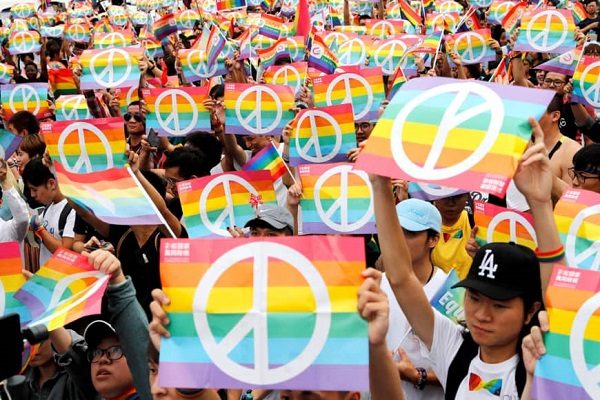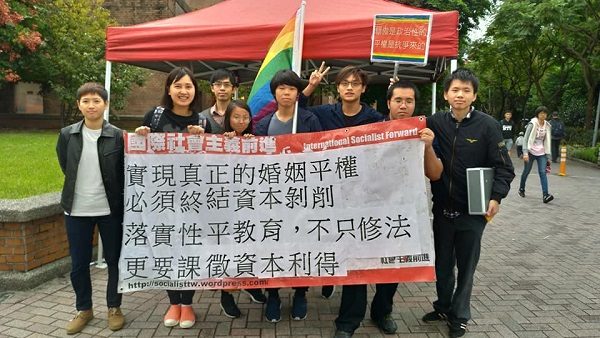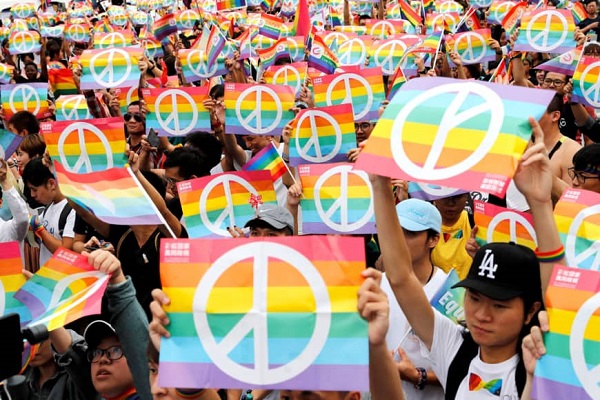The failure of Taiwan’s pro-LGBT referendum does not represent the end of the marriage equality and LGBT movement – we need to rebuild a fighting LGBT movement against further attacks
Luka, International Socialist Forward (CWI in Taiwan)
The victory of the anti-LGBT referendum in November, by a large margin, was a blow to the struggle for marriage equality in Taiwan. Taiwan’s LGBT movement, seen as a pioneering force across the Asian continent, now faces a serious test.
Five referendums were held on November 24, 2018, in conjunction with local and regional elections. This included anti- and pro-LGBT referendums. The main propositions of the anti-LGBT referendum were: the civil code can only recognise marriage between members of the opposite sex; gender equity education to be removed from primary and secondary schools; limitation of homosexual partnership with a discriminatory special law.

Special law
The far-right anti-LGBT forces who were behind this referendum blame social problems, like low birth rate, on LGBT communities, making them a scapegoat for the current social crisis, in order to cover up the real causes of crisis: capitalist political parties and capitalism.
The anti-LGBT referendum got 7.04 million yes votes, compared to 3.44 million for the pro-LGBT referendum. On the following day, Taiwan’s government announced it would draw up a special law giving same sex marriage a separate status outside of existing marriage laws. With the success of their referendum the anti-LGBT forces have launched further attacks, opposing any recognition of same sex “marriage” but only “partnership”. According to law, partnership confers fewer rights than marriage, and this new demand of the anti-LGBT forces is unconstitutional. If successful, it would amount to legislating the discrimination of LGBT people.
The ruling Democratic Progressive Party (DPP), which was elected in 2016 on a promise to legalise same sex marriage, is under pressure from the anti-LGBT forces, but it also fears that if it pushes for the special law immediately, it will completely alienate the pro-LGBT people and face an even bigger loss of support at the general election next year.
After the referendum, pro-LGBT legislators from the DPP and the leadership of the mainstream LGBT movement have further bowed to the pressure from anti-LGBT forces, abandoning their previous demand to amend the civil code in order to recognise same sex marriage. They excuse this retreat citing “lack of public support”, betraying the three million voters who supported marriage equality. In fact the movement’s leadership is shifting blame from their own failings onto the masses. In the face of further attacks, the retreat of the movement’s leadership can further encourage the anti-LGBT forces and conservative ideas, with the result that the movement could suffer even bigger blows.
The failure of pro-LGBT referendum does not represent the end of the marriage equality and LGBT movement. Now we need to re-build a fighting LGBT movement against more attacks. With a correct strategy and perspective the movement can overturn the current upsurge of anti-LGBT forces.
As International Socialist Forward (ISF) has stressed all the time, referendums under capitalism are far from democratic, because the voice of progressive youth and workers is usually drowned out by the capitalists and their agents with lots of money and control of corporate media. Only through mass struggle, mounting a direct challenge against anti-LGBT politicians and religious forces, and showing a political alternative, can the LGBT movement win.
Big business backing
The anti-LGBT religious forces have got lots of support from big business and establishment politicians, who provide large amount of resources for them, with which they conduct a scaremongering campaign and stir up prejudice and discrimination. This is one of the reasons they won this undemocratic referendum. According to a report by Apple Daily, the foundations set up by Wang Hongxue, the chairwoman of HTC, a multinational electronics company based in Taiwan, have provided NT$900 million (around US$30 million) for anti-LGBT religious organisations and activities in recent years.
A ‘charitable trust’ set up by Formosa Plastics, the biggest private business in Taiwan, once gave Wang’s foundations NT$300 million for arranging anti-LGBT ‘courses’. The anti-LGBT forces have also spent huge funds on advertising in the media, streets, and even in schools and universities, defaming LGBT and same-sex marriage and inciting homophobia. In addition, they can mobilise a section of voters through religious structures.
Moreover, the referendum law is extremely unfair to youth and the working class, not allowing migrants to vote in the constituencies where they live, which undermines the turnout among young people and workers who leave their hometown for education or work. It is shown by experiences in other countries that young people and workers are the main forces for the success of the LGBT movement. Therefore, the structure of this undemocratic referendum was inherently disadvantageous to the marriage equality movement.
Nevertheless, in our opinion the pro-LGBT referendum could have won. In the period for collecting signatures, 500,000 signatures were gathered within a month, showing the enthusiastic support for this idea among workers and youth in particular. (The referendum law stipulates that only when signatures from 1.5 percent – around 280,000 – of total eligible voters are collected in half a year, can a referendum be held).
Although the funds raised by the movement were much smaller than anti-LGBT forces and only hundreds of activists went onto the streets for canvassing, the pro-LGBT referendum got three million yes votes. These results show that the movement has huge potential. If the leadership of the movement had mobilised and organised the supporters who were not active in the movement, the movement could have had enough power to defeat the anti-LGBT forces.
Unfortunately, the leadership deliberately de-politicised the movement and refused to challenge the anti-LGBT forces and big business standing behind them. They peddled the illusion that marriage equality is only a “legal issue”, downplaying its political nature and the vital role of mass struggle. Moreover, they more than once intervened to demobilise the movement, such as asking grassroots activists to “wait” for the referendum after having collected enough signatures. This approach dissipated the power of the movement and gave space for the anti-LGBT forces’ propaganda. At the same time, the approach of organised mass struggle which ISF stands for is dismissed as “too radical” by the leadership of the mainstream LGBT movement.

Rebuild the movement
In order to defeat the government’s special law and further attacks from the anti-LGBT forces, and to rebuild an LGBT movement powerful enough to win marriage equality, the movement needs new methods, that is, a mass movement based on democratic grassroots organisations and struggle against the conservative, undemocratic rule of the capitalist parties and big business. Therefore, this movement must link up with an anti-capitalist working class movement, which has the strongest power to change the society.
In the first half of 2018, ISF strived to link the pro-LGBT referendum to the referendum against the neo-liberal labour law reform. We pointed out that united struggles against the anti-LGBT forces could help unite the working class, while on the other hand, only the united struggles of working class people against capitalism can provide everyone with the material resources necessary for real marriage equality and provide enough resources for gender equity education under a publicly-owned and controlled schools system. In order to reach these goals, we need to break the control of the capitalists over social wealth, and replace the patriarchal capitalist system and the dictatorship of big business with democratic socialist public ownership and economic planning.




